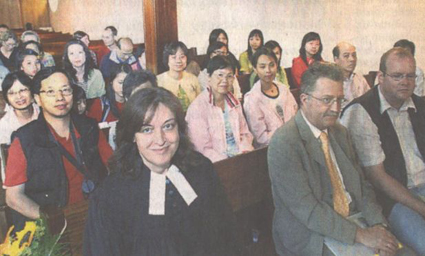 |
Press Comments about Johannes Rebmann Foundation |
||
|
Start • Sitemap |
"Ludwigsburger
Kreiszeitung" July 23, 2007:
Chinese Christians walk
on German Missionarie's Traces Party visits townships of Wilhelm Maisch, Rudolf Lechler and Ernst Fischle - Ten days for a visit in Southwest of Germany - Tourist topics also on the agenda GERLINGEN/Germany. More than 100 years ago Wilhelm Maisch traveled the first time as a missionary to China. His work there takes effect to this day. Translated into English from the German text of MS. MELANIE BRAUN Devout the Chinese guests sit together with a few German visitors in the forefront in the church Petruskirche and listen to the church service. It's not a normal prayer but rather a special honor to the former missionary Wilhelm Maisch: In the honorific speech Reverend Sabine Goller-Braun recognizes the missionary work, then follows a retrospection about Maisch's life by Mr. Imanuel Stutzmann, Vice Chairman of Johannes Rebmann Foundation. "For the Chinese Christians the missionaries are very important", says Mr. Ulrich Bubeck, Director of the German sector of Basler Mission. Because in the Chinese culture respect for forefathers is very strong. "We are sometimes amazed when Chinese guests have more knowledge about German missionaries than many Germans", tells Bubeck, who co-organized the Asians' journey. Once a year a delegation from China comes for a visit to Germany. This year the 10 day tour is themed "On the Traces of the Missionaries". One of the most important missionaries in South China was Wilhelm Maisch from Gerlingen, who traveled in 1904 the first time to the Celestial Empire and worked there for almost 20 years. Because his utmost concern was not to oppress or command the Chinese Christians but let them build up their parish in personal responsibility. So he wrote short before his biennial home leave in 1920: "The Europeans must come down from their throne. What we need is an independent Chinese church." Maisch had been an pioneer since ever, reports Stutzmann, who was engaged intensively with the history of the missionary. The Vice Chairman tells the attender at the church: "He started school already in the age of five, two years earlier than other kids". In the age of 19 years he came to the Mission House in Basel/Switzerland and studied there for seven years - "with ease", accents Stutzmann. In China Maisch became very quickly Präses (Chairman) of his community and got nominated for Chief Chairman for South China. Because of cardiac insufficiency the missionary from Gerlingen died in 1924 in Kutsuk/China in the age of 46 years. His grave was disregard during the cultural revolution between 1966 und 1976 and was considered to be forgotten. Only last year Mr. Thomas Tsang, Secretary General of Tsung Tsin Mission in Hong Kong, found Maisch's last resting-place again - to the surprise and pleasure of the descendants in Gerlingen. The Chinese Christians concentrate not only on Wilhelm Maisch during their visit in South Germany: Yesterday they visited the grave of missionary Rudolf Lechler in Kornwestheim and the resting-place of missionary Ernst Fischle in Esslingen. "But also meeting the parishes is very important for the Chinese", says Bubeck - and some touristy topics like the visit of Mercedes Museums are also on the agenda.
|
||
| Imprint | Contact: info@johannes-rebmann-stiftung.de |
